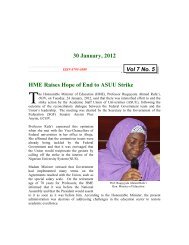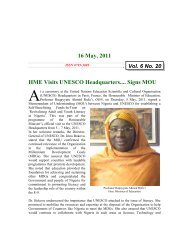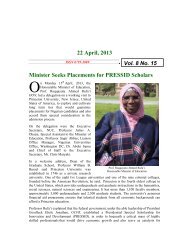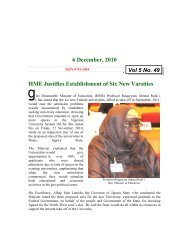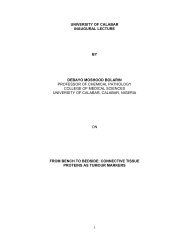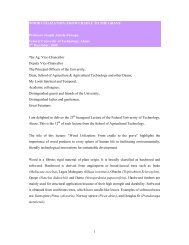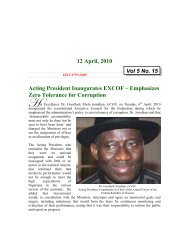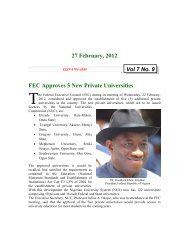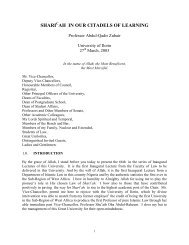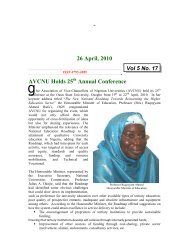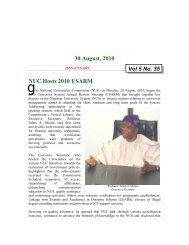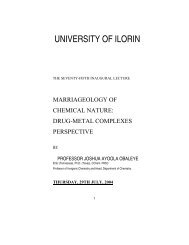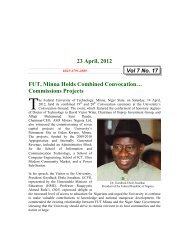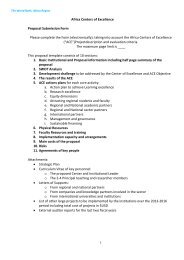From State And State Power To Man And Social - National ...
From State And State Power To Man And Social - National ...
From State And State Power To Man And Social - National ...
Create successful ePaper yourself
Turn your PDF publications into a flip-book with our unique Google optimized e-Paper software.
Foreign Affairs; the nature of the relationship between the Foreign Ministry and the DiplomaticMissions abroad; the composition and orientation of the legislature; the collective influence ofthe foreign policy elite; the weakness of public opinion as an influence on policy; the littlesignificance accorded to the recommendations of periodic, ad hoc people’s conferences onforeign policy; the marginal impact of the findings of foreign policy research institutes; the coincidence,overlap or commonality of the economic interests of public officials and privateentrepreneurs; religion and ethnicity; decentralization of the responsibility for foreign policydecision-making and implementation among several Ministries, and the consequentbureaucratic/organizational politics; the nature of the political party system and the pattern ofcontrol of the legislature by the political parties; the nature of inter-agency relationships andcontacts among all the bureaucratic units involved in foreign policy formulation andimplementation; the quantum, quality and variety of information, about the domestic andexternal environment, available to decision-makers; external influence. In stead of a theoreticalmodel or conceptual framework, what we have is an incoherent list of factors. Significantly,however, they are all internal factors. The implication is that Nigeria’s foreign policy is, after all,shaped largely by domestic variables.In general the contributors of the empirical case studies in the volume, came to the followingconclusions.(a) The values and political style of the Head of Government operating within thecontext of political elite interaction are the most potent variables in decision-making in the postcolonialstate.(b) The Head of Government (Prime Minister) played a dominant role in foreignpolicy decision making because of the limitation of the power of constraint of other factors; alsoinstitutional involvement in decision making was limited.(c) Historically, the FederalGovernment has, sometimes, assayed to take public opinion into consideration in foreign policydecision making, and in some respects to identify itself with public demands In general,however, public opinion plays little role in shaping Nigeria’s foreign policy.(d)Similarly, theviews of enlightened foreign policy elite in Nigeria have not counted for much in the foreignpolicy making process.2. INTERNATIONAL RELATIONS AS THE STRUGGLE FOR LAND AND OIL:CONFLICT BETWEEN NIGERIA AND CAMEROON OVER THE BAKASIPENINSULA [2002, 2005]The issue in Nigeria’s diplomatic history that lent itself to a most poignant demonstration ofwhat international relations is all about, and how its misunderstanding as crude contest for powercan be, not only misleading, but also very costly to a nation was the conflict over the Bakasipeninsula. Following the judgment by the International Court of Justice, at The Hague, inOctober, 2002, concerning the territorial dispute between Nigeria and Cameroon, there werecalls on the Nigerian government, by some Nigerians, to go to war over the matter. I observedthat the responses and reactions of many people, including those who represented Nigeria on thecase, at The Hague, did not reflect a thorough understanding of the issues involved in the case. Inparticular, the political context of the dispute was not fully appreciated by many Nigerians. Itherefore presented for publication a study made earlier and first presented in a seminar in 1998,which placed, in proper context, the boundary and territorial disputes between Nigeria andCameroon, including the conflict over Bakasi.14



